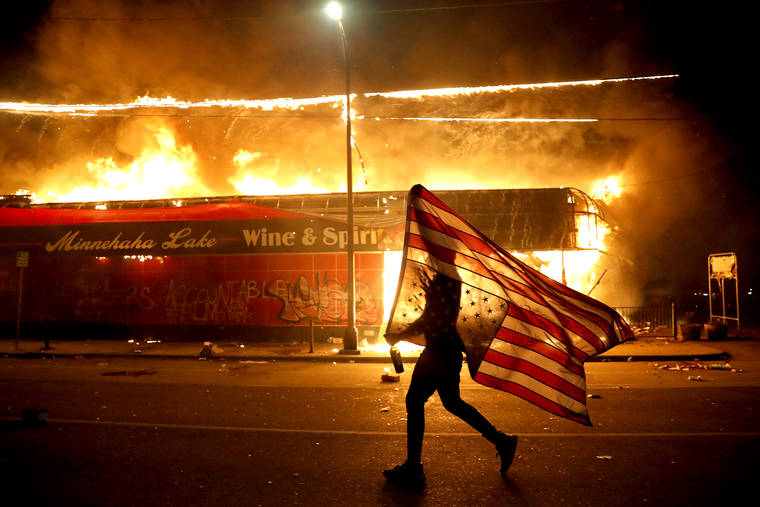MINNEAPOLIS — The white Minneapolis police officer who pressed his knee into George Floyd’s neck as he begged for air was arrested Friday and charged with murder, as authorities imposed overnight curfews to try to stem violent protests over police killings of African Americans that have spread to cities across the country.
Thousands of protesters marched through downtown Minneapolis past curfew and encircled a police precinct station. “Prosecute the police!” some chanted, and “Say his name: George Floyd!” There was no violence, but some protesters sprayed graffiti on buildings. Elsewhere in the city, officers fired tear gas and rubber bullets to drive back crowds of protesters.
It wasn’t clear if — or how — authorities would enforce the curfew amid sharp questions about how city and state leaders have handled the crisis. The restrictions came a night after protesters torched an abandoned police station.
The renewed protests come the same day Officer Derek Chauvin, 44, was charged with third-degree murder and second-degree manslaughter. He also was accused of ignoring another officer who expressed concerns about Floyd as he lay handcuffed on the ground, pleading that he could not breathe as Chauvin pressed his knee into his neck for several minutes. Floyd, who was black, had been arrested on suspicion of using a counterfeit bill at a store.
Chauvin, who was fired along with three other officers who were at the scene, faces more than 12 years in prison if convicted of murder.
An attorney for Floyd’s family welcomed the arrest but said he expected a more serious murder charge and wants the other officers arrested, too.
Prosecutor Mike Freeman said more charges were possible, but authorities “felt it appropriate to focus on the most dangerous perpetrator.” Minneapolis Mayor Jacob Frey’s curfew also will be in place today, and nearby cities announced similar restrictions.
“I know that whatever hope you feel today is tempered with skepticism and a righteous outrage,” Frey said in a statement. “Today’s decision from the County Attorney is an essential first step on a longer road toward justice and healing our city.”
Protests nationwide are fueled by outrage over Floyd’s death and years of police violence against African Americans. Protesters smashed windows at CNN headquarters in Atlanta, set a police car on fire and struck officers with bottles. Large demonstrations in New York, Houston, Washington, D.C., and other cities ranged from people peacefully blocking roads to clashing with police.
“You are disgracing our city,” Atlanta Mayor Keisha Lance Bottoms told protesters. “You are disgracing the life of George Floyd and every other person who has been killed in this country.”
Police were trying to put Floyd in a squad car Monday when he stiffened and fell to the ground, saying he was claustrophobic, a criminal complaint said. Chauvin and Officer Tou Thoa arrived and tried several times to get the struggling Floyd into the car.
Chauvin pulled Floyd out of the passenger side, and the handcuffed Floyd went to the ground face down. Officer J.K. Kueng held Floyd’s back and Officer Thomas Lane held his legs while Chauvin put his knee on Floyd’s head and neck area, the complaint said.
When Lane asked if Floyd should be rolled onto his side, Chauvin said, “No, staying put is where we got him.” Lane said he was “worried about excited delirium or whatever.”
An autopsy said the combined effects of being restrained, potential intoxicants in Floyd’s system and his underlying health issues, including heart disease, likely contributed to his death. It revealed nothing to support strangulation as the cause of death.
There were no other details about intoxicants, and toxicology results can take weeks. In the 911 call that drew police, the caller describes the man suspected of paying with counterfeit money as “awfully drunk and he’s not in control of himself.”



